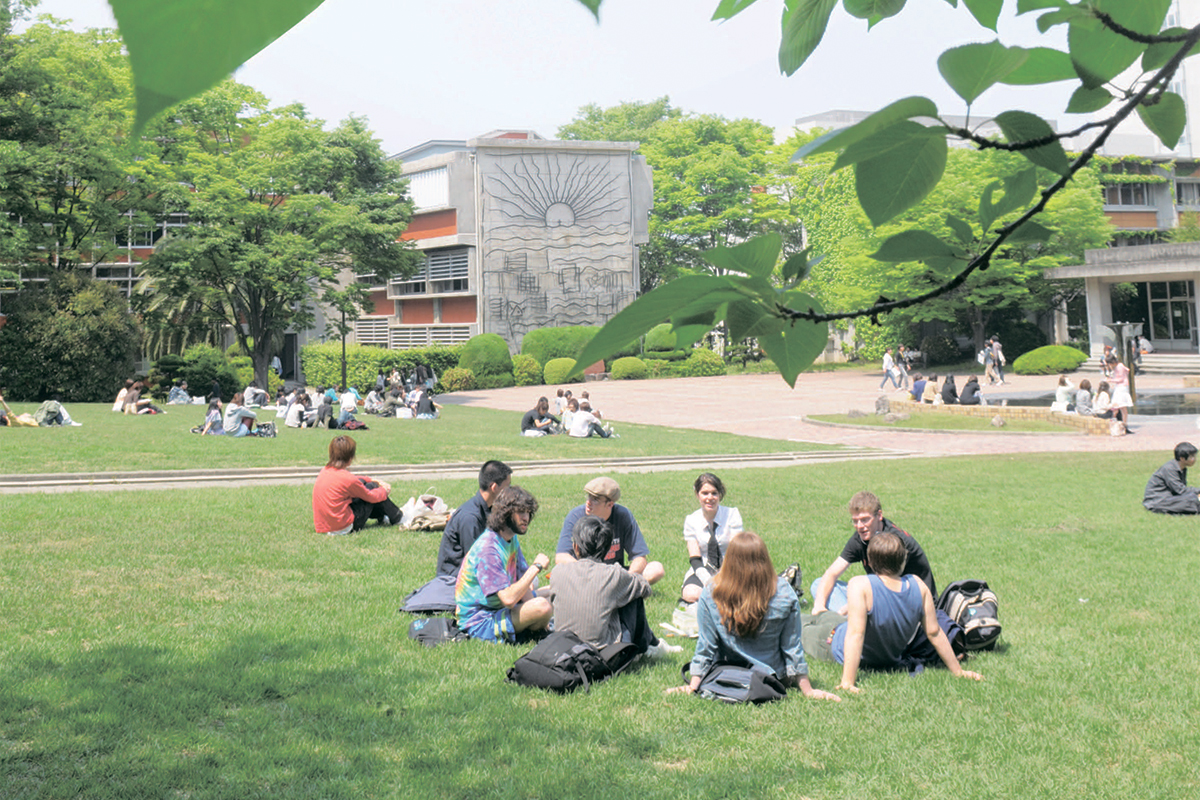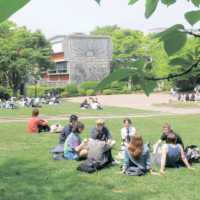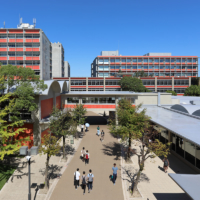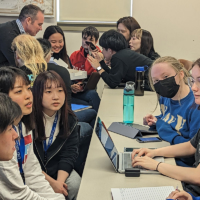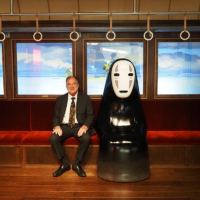Located in Yagoto in eastern Nagoya, Nanzan University opened its doors immediately following the end of World War II with the goal of providing language education to assist the Japanese in building a presence on the international stage. What missionary Rev. Aloysius Pache started as the College of Foreign Languages in 1946 has since transformed into an institution with eight faculties and six graduate schools, as well as the Center for Japanese Studies, serving over 10,000 students, 450 of them from abroad.
Nanzan President Robert Kisala said that through the fostering of diversity in its curriculum and initiatives, such as promoting dialogue, respect and international exchange, the university is only honoring the educational philosophy encapsulated in its motto: “For Human Dignity.”
Promoting human dignity

“Our motto is becoming even more relevant to the world today because of the problems that we continue to experience. We can see that human dignity is not yet recognized or promoted for all people,” Kisala said. “And I think that’s especially become apparent during the pandemic. I think the pandemic helps to focus on some of the inequalities or remaining inequalities in our world. And obviously with the invasion of Ukraine by Russia in the past year, we see that rights are still being violated in many parts of the world. So, in that sense human dignity becomes even more important.”
Kisala added: “And from the other side, I think the emphasis on the (U.N.) sustainable development goals in recent years also points to a positive approach to promoting and preserving human dignity. I personally believe that the SDGs embody the spirit, and help to concretize the meaning of, human dignity. They’re common goals set by all of humanity in order to preserve and promote human dignity, and so I think this also helps to once again focus our attention on the importance of human dignity.”
So fundamental is this idea, that human dignity classes are part of the program of study. Students must take at least two human dignity classes from eight different categories of such courses.
“Academically, that helps to give some focus to what we mean by human dignity and how it has practical applications for the different fields of study here at the university,” Kisala said. “Economics and human dignity might entail, broadly, the implications for economics on human dignity, and how to promote human dignity through different economic models or through different economic patterns. We have specialists in each of the fields teaching about what concrete meaning human dignity has within that field.”
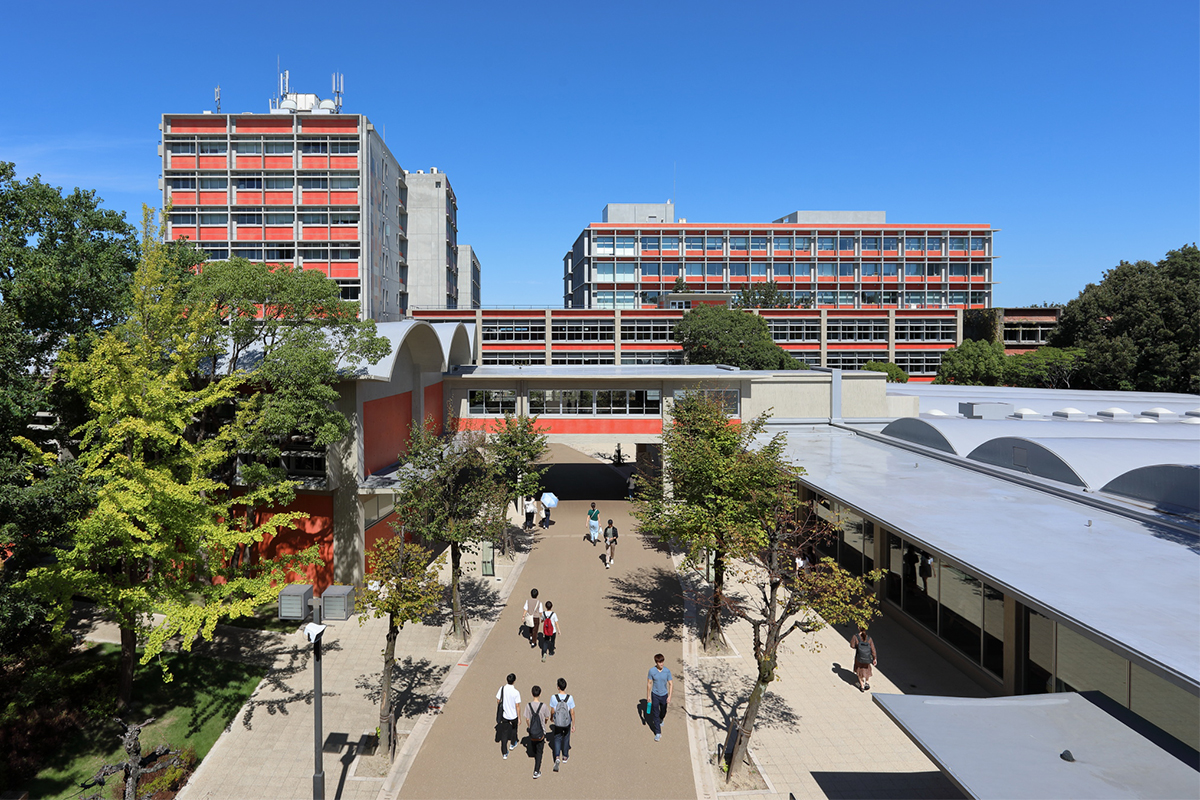
Maintaining partnerships with 118 universities around the world is another way this school in Aichi Prefecture upholds its motto. Many of these universities send students to Nanzan’s Center for Japanese Studies, and currently, about 100 Nanzan students are studying abroad. The U.S. and Europe remain popular destinations, but students are also studying in Mexico, parts of Latin America, and in Asia. Recently, Nanzan signed an agreement with an Ethiopian university, in a move to expand to Africa.
COIL program
Kisala pointed to this extensive network as one of the reasons that Nanzan was selected by the Japanese government as one of 10 universities to implement its Collaborative Online International Learning program in 2018. COIL uses technology to connect university students across the globe. The students may have written exchanges, real-time video interactions and work on assignments together.
“An attractive feature to our plan was diversity. For example, my understanding is that some of the other universities that were selected for the COIL program are focused on a particular faculty or particular department. Here at Nanzan it goes across all of our faculties. So, anybody at the university could be involved in the COIL program,” Kisala said. “Also there is diversity in terms of the makeup of the program. We talk about three different stages of the COIL program: basic, academic and project-based learning. We begin with the basic, that’s just, for example, an exchange conversation with students in the United States and students here on campus. Then there’s academic, which would be one step above that, where the students are working on a common research project together. The third stage involves problem-based learning work.”
“We also partnered with some of the companies here in Aichi and asked them to propose a specific problem or a specific field that needed to be studied. The students involved here at the university and abroad through the COIL program would then work together in order to come up with a solution to this problem that was raised by the company here, so it also increases our cooperation with the business world here as well,” Kisala added.
The official government COIL program ended in March, but it was such a tremendous success that Nanzan plans to continue the program on its own. For one thing, it helped to deepen its relationship with partner schools, especially during the pandemic when actual study abroad was not possible. In addition, all faculties at Nanzan offer a short-term study abroad program, for which COIL is now used to prepare the participants. COIL is also used to facilitate reflective learning when the students return. While the task of implementing COIL seemed daunting at first, the rewards of exposing students to various viewpoints have been well worth it. On March 15, for the first time since 2019, Nanzan COIL students were finally able to partake in a two-week visit to the University of North Georgia in the U.S.
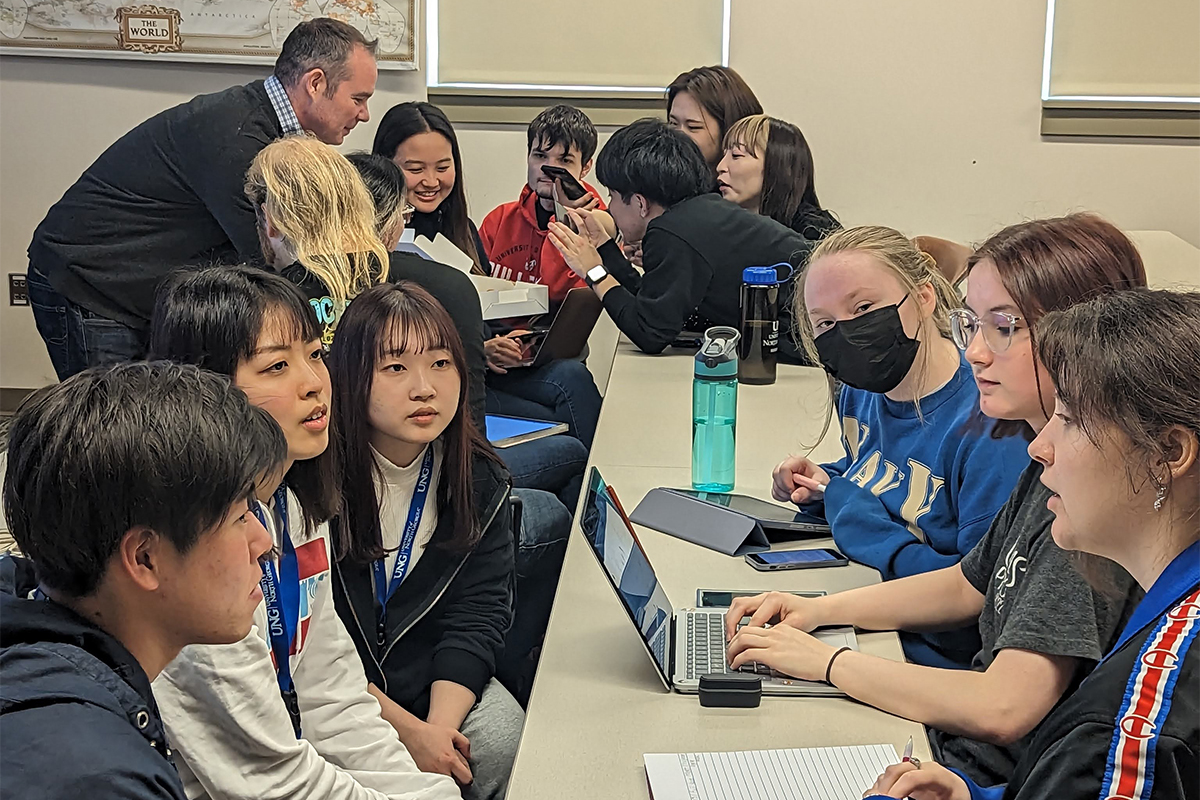
“I teach a class in English about religion in the contemporary U.S., and for the COIL program, my students in that class have an exchange with the students at University of Denver, where they ask the Denver students about religion in the U.S. or their experience of religion today,” Kisala said. “And the Denver students ask my students about Japanese culture, as they’re studying Japanese language, and they have a project that they have to do involving some aspect of Japanese culture. So, the exchange was on that level, and it worked out quite well.”
In one case, students in another class worked on a “car of the future” proposal for a well-known automaker in Aichi, Kisala added.
‘Anime Study Tour’
Further ties with the business community are also represented by Nanzan’s official partnership with Ghibli Park, a theme park that opened last year in the prefecture under the aegis of the renowned Studio Ghibli. Nanzan is currently devising ways to allow students to benefit from this alliance.
“We’re hoping to establish some special programs here at the university in connection with the work of Studio Ghibli, and especially what’s present at Ghibli Park,” Kisala said. “In terms of the courses, I have specialized in contemporary religion, especially contemporary Japanese religion. And for many years I’ve been aware that a great deal of literature has been published regarding the religious themes in Japanese anime. And through our connection with Ghibli Park, I started focusing more on that, and I’m hoping to incorporate that in some of my classes as well.”
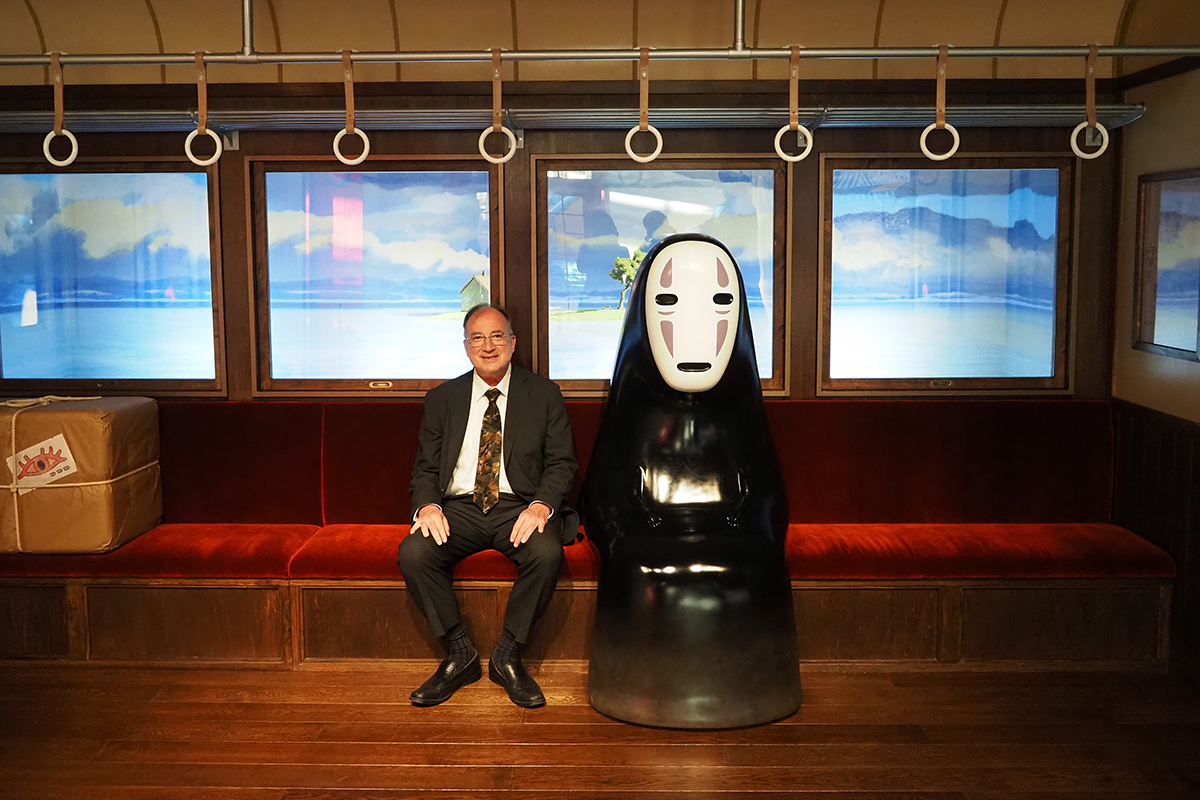
Anime is a big pull for many visitors to Japan. Aware of this, Nanzan will launch its “Anime Study Tour” this year, a three-week program for overseas students that helps them explore Japanese culture and society through the lens of anime. In the mornings, they will have lectures on different aspects of anime, and the afternoons will be reserved for cultural activities. These include two field trips to visit anime-related sites and a Ghibli Park excursion. The summer program, Kisala said, comes at a time when, fortunately, anime, “a doorway into contemporary Japanese culture,” is becoming more a part of the scene in Aichi.
Human Dignity Award
Having just celebrated its 75th anniversary two years ago, the university is now in a purposeful procession toward its 100th year. It has already established concrete goals to guide it on that path, but the anniversary provided an opportunity to recast and reaffirm its commitment to its core principles. Over the next 25 years, the university will be looking to improve academic diversity by increasing interdisciplinary study. It will also continue the Nanzan University Human Dignity Award, which was established last year to recognize contributions to the promotion of human dignity.
“Every year, we identify one person or one group that has made a special contribution to the advancement of human dignity and invite them to come to the campus to give a lecture on their work. The first recipient of the award last year happened to be a graduate of Nanzan University. But it’s certainly not limited to people associated with the university,” Kisala said. “The idea is that through the establishment of this award … the content or the meaning of human dignity becomes more concrete for all of us by hearing about the work of people who have made significant contributions to it.”
It is also hoped that the importance of human dignity will be more apparent to people outside the university itself, and that more and more people will become aware of the importance of it.
International exchange
The university will continue to encourage students to study abroad, but it will also continue to provide spaces on campus for international exchange. The Stella multicultural exchange lounge is one such place, with a range of casual and academic programs on offer. The lounge is staffed by students and is the center of extracurricular interactions on campus. In the World Plaza, students are not allowed to speak Japanese. They are encouraged to speak English or other foreign languages.
On the other hand, in the Japan Plaza, students must speak Japanese. Overseas students coming from all over the world can practice Japanese language and learn Japanese culture there. There is also a Language Buddy system, in which foreign students and Japanese students have one-on-one language exchange opportunities at least once a week.

Additionally, Nanzan University opened a new residence last year called the Janssen International Residence. The large dormitory, situated right next to the university campus, can house as many as 178 students. The concept of the residence is to have students from Japan and abroad live together and learn from each other. An educational program called Skill Development Program for Diversity and Inclusion has also been developed for the residence to promote international exchanges and understanding.

Importance of diversity
When the president first came to Japan as a young man in 1978, he studied at the Center for Japanese Studies. Thanks to this experience, Kisala appreciates the importance of diversity and the dialogue it facilitates. He encourages all students to “enjoy the diversity” that an international education affords.
“Many people have a false idea that dialogue is somehow trying to come to a compromise with our beliefs. That it’s a watering down of what we believe in order to get along with other people. But I think it’s quite the opposite of that. I think dialogue is a common search for the truth,” Kisala said. “There are certain questions about the meaning of our lives, our purpose in this world that none of us has the final answer for, and for that reason we need each other. It’s not a matter of tolerating differences, but we absolutely need each other because we all have different perspectives on that common truth. And we need to be able to share our different perspectives in order to come to a fuller understanding of it. And so, for that reason, I think diversity in many ways, not just culturally, but gender diversity and age, generational diversity, is absolutely essential for all of our lives.”
This page is sponsored by Nanzan University.
Nanzan University

Address: 18 Yamazato-cho, Showa-ku, Nagoya 466-8673, Japan
Tel: +81-52-832-3111
E-mail: [email protected]
URL: https://www.nanzan-u.ac.jp/English/



